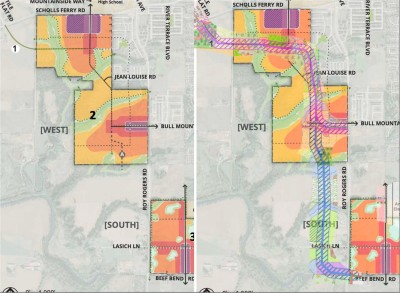By Andrew Mulkey and Krystal Eldridge
A years-long fight to prevent an unnecessary, unfounded, costly, and – as it turns out now – illegal expansion of Washington County roads onto farmland has finally ended. 1000 Friends of Oregon recently appealed the county’s Ordinance 882, which amended the county’s transportation plan, to the Land Use Board of Appeals (LUBA). Local farmers, local residents, and the City of Tigard joined in our appeal.
Efforts like this use our tool of last resort – litigation – to continue the work that residents and other local organizations have been leading, in this case since at least 2021. The July 30 LUBA decision vindicates the voices of Washington County residents who persistently and vocally opposed the extension of Tile Flat Road onto their neighboring farmland.
Some background
Washington County has long wanted a three-lane, eight-mile-long collector road through productive farmland in the southwest part of the county, a de-facto Westside Bypass.
The effort would have negatively impacted farmland and farm operations, as well as local watersheds to the Tualatin River, and it would have set up the metro area for the wrong types of regional growth. “This proposed refinement study area hosts so much of what Washington County residents hold dear – high-value farmland, tree canopy, and a riparian corridor where federally listed steelhead was positively identified,” says Glenn Fee, executive director of Tualatin Riverkeepers.
We helped defeat the Cornelius Pass Road extension portion with community members and our friends at Tualatin Riverkeepers, The Street Trust, and Save Helvetia, but the county pushed forward on the related Tile Flat Road extension.

Then in early 2023, Metro swapped about 500 acres from the Clackamas side of the Metro urban growth boundary (UGB) to the Tigard side, an unprecedented move to make better use of available land for housing. We supported the swap and still stand by its value, especially the City of Tigard’s housing efforts. At the time, our transportation director and legislative manager, Brett Morgan, also noted that it remained “unclear if long-term issues around transportation, water-system health, and farming had been addressed.”
In proposing the new bypass, the city hadn’t addressed those issues. And in fact, against the wishes of the City of Tigard, the road would have run through the heart of the newly proposed housing and across already degraded riparian environments.
“The remand and rejection of Ordinance 882 represent multiple years of community organizing, advocacy, and involvement in land use decisions,” says Morgan, who worked on the issue with 1000 Friends of Oregon until April.
Doomed, legally speaking
In pushing forward with Ordinance 882, the county planning staff and the board of commissioners failed to listen to their constituents, including calls that their proposal failed to follow the law required by Oregon’s transportation planning rule. The county proposed building new roadways on farmland and within the City of Tigard’s portion of the region’s UGB without meeting any of the standards for doing so.
We raised many of those standards in our appeal, and LUBA determined that the county had failed to comply with practically all of them. Most importantly, the county failed to demonstrate that the roadways were even needed, which is an essential part of the transportation-planning process.
The county had tried to subvert this analysis by claiming it could address that need at a later time, which the law very clearly does not allow. (Let’s be real – that’s also not very sensible.) When that argument seemed doomed to fail, the county shamelessly and disingenuously tried to supplement their arguments with additional information that had not previously been made publicly available. To add insult to injury, the county tried this move after all public comment was closed and the case had been argued and briefed.
Shared success
This case would not have been possible without the consistent and tireless advocacy of local residents and farmers as well as groups like Tualatin Riverkeepers. Their attention, focus, and determination was immensely helpful to 1000 Friends of Oregon in our advocacy at the county and in pursuit of this appeal. Variations of this proposal have been around for decades, and the attention and voices will likely be needed into the future to ensure that the county will comply with the law.
“Since 2021, 1000 Friends and their supporters and partners have explained why a major collector road through farmland is a bad idea for Oregon’s land use system and for future Oregonians,” says Morgan. “Rules and laws passed by 1000 Friends, such as the Climate Friendly and Equitable Communities Rulemaking, will help continue to provide a backstop against this type of harmful development. I am so happy with this outcome and to have played a small role in a long history of fighting sprawl in Washington County.”
“The nearby landowners and residents did incredible work to express why this proposed ordinance was a poor decision and to galvanize additional Washington County residents and organizations,” added Fee. “Development pressures in the county are at an all-time high and land use decisions must be made in concert with protections of natural resources and threatened species like salmonids. We’re pleased by a growing coalition of family farm owners, recreationists, and residents who are committed to protecting what makes living in Washington County so special.”
Thank you to all the new supporters who joined forces with us throughout the years fighting these ordinances, especially making use of our action alerts to send messages to your elected representatives.
Sign up for our alerts to be notified of issues in your area when we take action to protect local land use.
Resources: Decision
